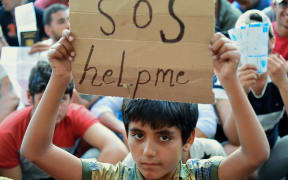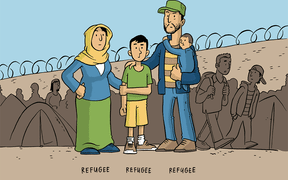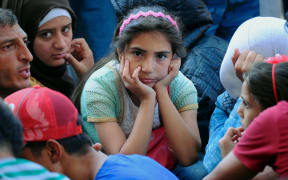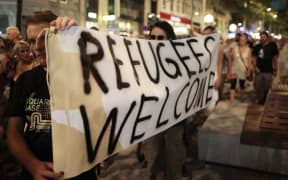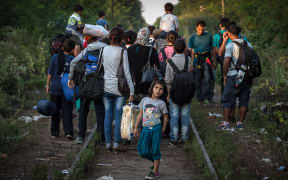A stand-off is continuing in Hungary after riot police ordered a large number of migrants off a train that had left the capital Budapest.
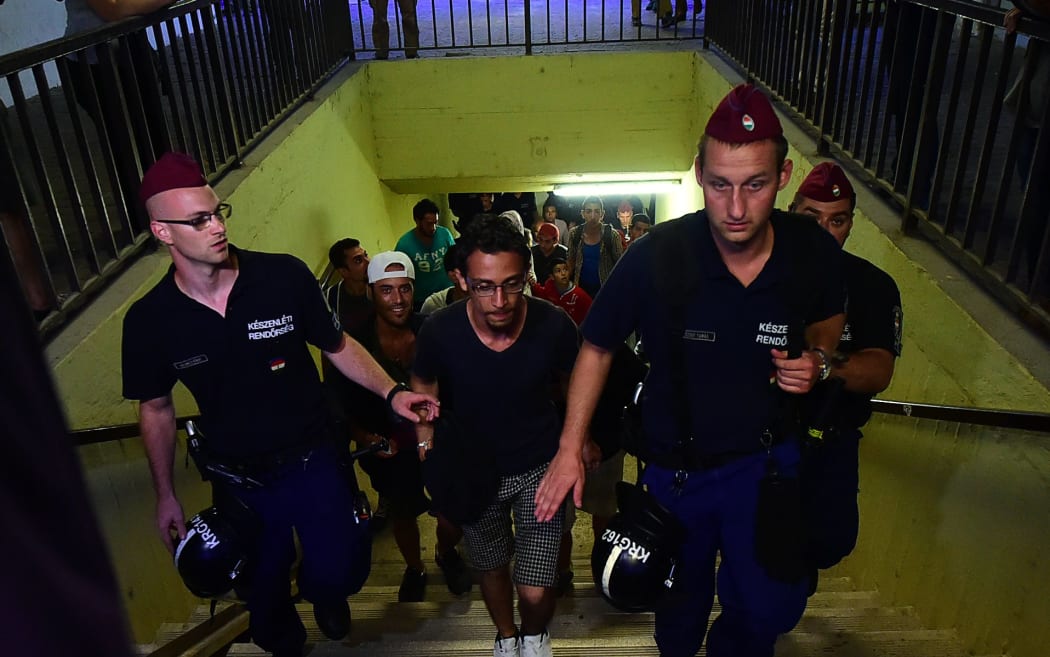
Refugees are escorted by police officials at Bicske train station. Photo: AFP
Hungary has been taking asylum-seekers who were on a train they believed was headed to Western Europe, to a transit camp about 40km outside Budapest.
The city's eastern railway station was opened yesterday, after a two-day stand-off, to hundreds of refugees who had been camped outside it in the hope of catching a train to Germany and Austria.
But the first train to depart, packed with refugees, did not head for Western Europe but was stopped at the town of Bicske.
Riot police ordered the passengers off the train, but many resisted. Scuffles broke out and police ordered journalists from the scene, declaring Bicske an "operation zone".
Some of the asylum seekers refused to disembark, while others clung to railway tracks or fled. Still others wrestled with police, trying to get back on board.
The authorities managed to put many people on buses to take them to an asylum seeker reception centre within Hungary.
Those who refused to disembark banged on the windows of the train and shouted "No camp, no camp!"
A family - a man, his wife and their toddler - made their way onto the track next to the train and lay down in protest. It took a dozen riot police wrestling with the man to get them up again.
With Hungary's government promising to close the country off to migrants by mid-September, the standoff has become symbolic of a European asylum system brought to breaking point.
Earlier, the Hungarian Prime Minister, Viktor Orban, told European officials in Brussels that he would take a hard line from 15 September to require all refugees to register in his country before they can be considered for travel to the West.
He said Hungarians fear that European leaders cannot control the migrant flows.
Two thousand migrants are still stranded in Budapest's international train station, because trains are not being allowed to cross the border.
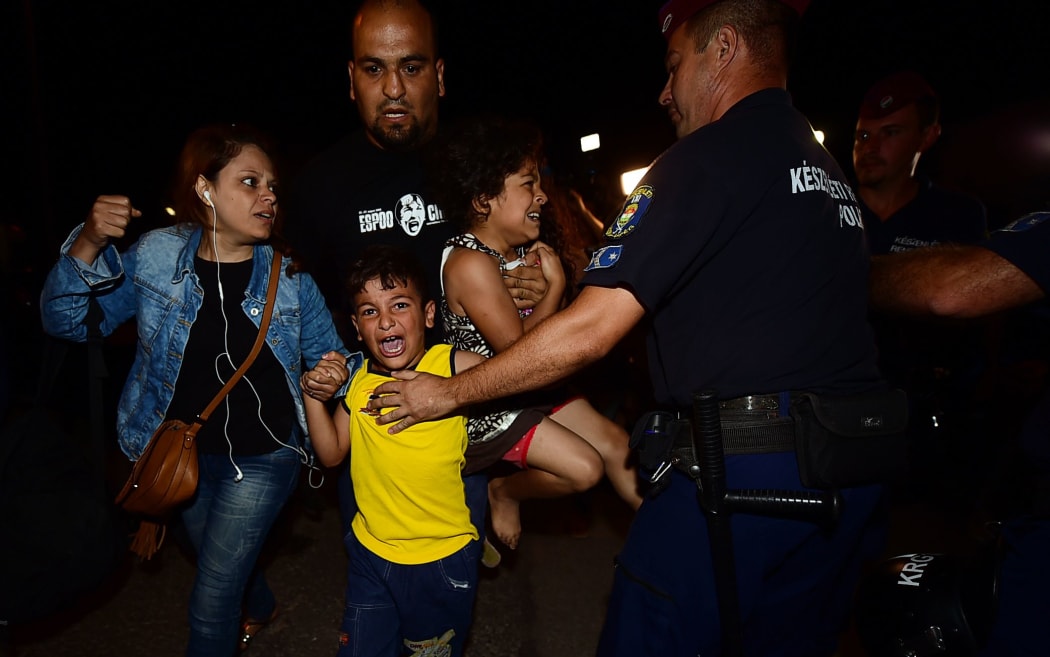
A migrant family is taken by Hungarian police to a bus bound for a refugee camp. Photo: AFP
A "German problem"
Mr Orban said the situation was a "German problem" as Germany was where those arriving in the EU "would like to go".
Germany is willing to bend European Union rules and take Syrian refugees without visas.
"The problem is not a European problem. The problem is a German problem.
"Nobody would like to stay in Hungary ... So if the German chancellor insists that nobody can leave Hungary without registration towards Germany, we will register them.
"What is going on is a shame. It's chaotic, it's not European," Mr Orban added. "It's not a way to come through the green border, going to the railway station, shouting the name of Germany and Chancellor Merkel and forcing the Hungarian police to let them go out of the country without registration."
Speaking at the same conference as Mr Orban, the European Council President Donald Tusk said at least 100,000 refugees should be distributed across EU states.
He said EU countries should sharply increase their offers to share out asylum seekers and they should also set up refugee reception centres close to war zones outside Europe.
Mr Tusk said EU leaders should be ready at a summit next month to commit much more money to the crisis.
In what could be the biggest change to the Europe's asylum rules since World War II, the leaders of France and Germany have proposed binding quotas of refugees for EU states.
German Chancellor Angela Merkel and French President Francois Hollande said the quota system should be permanent and mandatory.
Ms Merkel said the bloc must adhere to the basic principle that "those who need protection get it".
"We have a duty to defend the rights of those in need. The Geneva Convention on Refugees is binding - not just on Germany but on all member states of the European Union."
Mr Hollande said European solidarity must prevail as the incoming numbers are shared fairly among member states.
The bloc failed to reach such a deal in June.
EU foreign ministers are set to meet in Luxembourg to discuss the escalating crisis.
European Commission President Jean-Claude Juncker will next week unveil a plan to relocate at least 120,000 more refugees to ease the burden on Greece, Italy and Hungary.
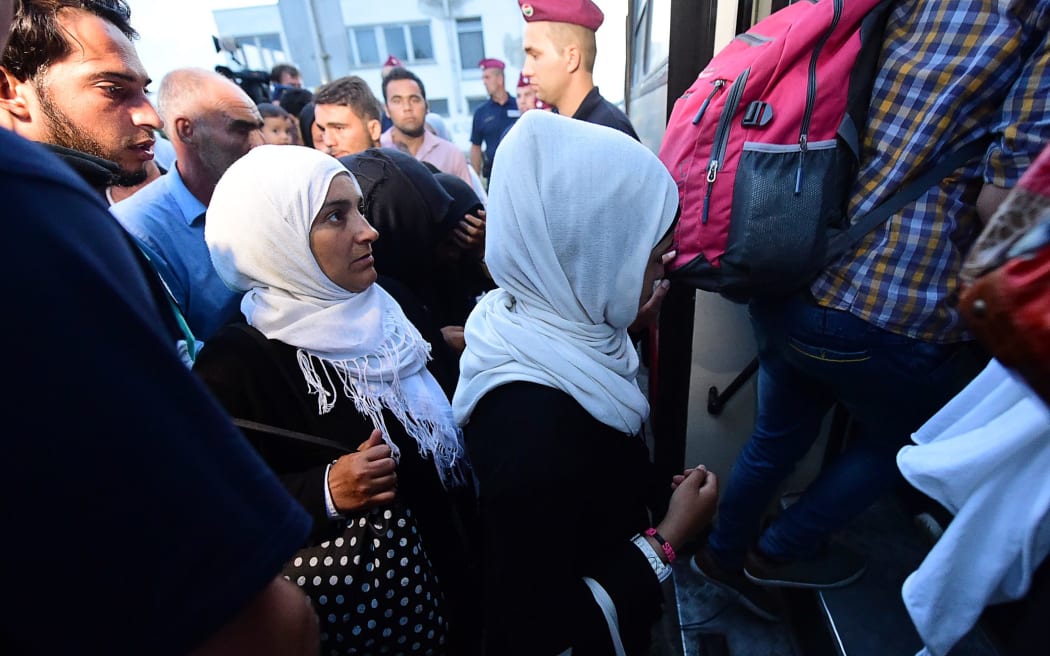
Migrants board a bus that will take them to a refugee camp. Photo: AFP
Arrests in Turkey
Meanwhile, the Turkish authorities have arrested suspected traffickers in relation to the deaths of 12 Syrian refugees in two boat sinkings this week, including a three-year-old boy whose body was photographed washed up on a resort beach.
The image of three-year-old Aylan on the beach at Bodrum spread rapidly on social media and has become a symbol of the refugee crisis.
The four arrested men, all Syrian nationals aged between 30 and 41, are accused of causing deaths and trafficking migrants.
The boy's father of has spoken of his desolation. Abdullah Kurdi lost both his sons and his wife when their boat overturned in high waves while heading to the Greek island of Kos.
The Kurdi family was trying to reach Canada to reunite with Abdullah's sister Teema but their asylum applications had been denied.
The Canadian immigration minister said he would investigate the reason for the refusal.
EU countries have so far committed to share about 32,000 asylum seekers from Italy and Greece, a number short of a European Commission proposal of 40,000.
A new proposal from the EU executive is expected next week.
-BBC, Reuters
